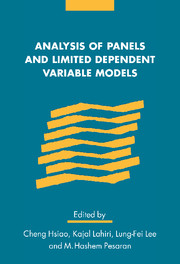Book contents
- Frontmatter
- Contents
- List of contributors
- Foreword
- Introduction
- 1 A note on left censoring
- 2 Autoregressive models with sample selectivity for panel data
- 3 Mixture of normals probit models
- 4 Estimation of dynamic limited-dependent rational expectations models
- 5 A Monte Carlo study of EC estimation in panel data models with limited dependent variables and heterogeneity
- 6 Properties of alternative estimators of dynamic panel models: an empirical analysis of cross-country data for the study of economic growth
- 7 Modified generalized instrumental variables estimation of panel data models with strictly exogenous instrumental variables
- 8 Expectations of expansions for estimators in a dynamic panel data model: some results for weakly exogenous regressors
- 9 Re-examining the rational expectations hypothesis using panel data on multi-period forecasts
- 10 Prediction from the regression model with one-way error components
- 11 Bayes estimation of short-run coefficients in dynamic panel data models
- 12 Bias reduction in estimating long-run relationships from dynamic heterogeneous panels
- CV of G.S. Maddala
- Index
9 - Re-examining the rational expectations hypothesis using panel data on multi-period forecasts
Published online by Cambridge University Press: 22 September 2009
- Frontmatter
- Contents
- List of contributors
- Foreword
- Introduction
- 1 A note on left censoring
- 2 Autoregressive models with sample selectivity for panel data
- 3 Mixture of normals probit models
- 4 Estimation of dynamic limited-dependent rational expectations models
- 5 A Monte Carlo study of EC estimation in panel data models with limited dependent variables and heterogeneity
- 6 Properties of alternative estimators of dynamic panel models: an empirical analysis of cross-country data for the study of economic growth
- 7 Modified generalized instrumental variables estimation of panel data models with strictly exogenous instrumental variables
- 8 Expectations of expansions for estimators in a dynamic panel data model: some results for weakly exogenous regressors
- 9 Re-examining the rational expectations hypothesis using panel data on multi-period forecasts
- 10 Prediction from the regression model with one-way error components
- 11 Bayes estimation of short-run coefficients in dynamic panel data models
- 12 Bias reduction in estimating long-run relationships from dynamic heterogeneous panels
- CV of G.S. Maddala
- Index
Summary
Introduction
In recent years the availability of relatively long panel data on expectations obtained from surveying professional forecasters has made it possible to test the validity of different expectations formations mechanisms in a scientific manner. The use of panel data enables the econometrician to decompose forecast errors into macroeconomic aggregate shocks for which forecasters should not be held responsible, and forecast specific idiosyncratic errors and biases for which they should be held accountable. Muth (1961) suggested that theories of expectation formation should be consistent with the economic model being considered, and defined expectations to be rational if they are equal to mathematical expectations conditional on the set of all information relevant for forecasting. Since the rational expectations hypothesis (REH) has wide-ranging implications for economic theory and policy, it is not surprising that several economists have used survey data on expectations in order to test REH directly. Using the American Statistical Association – National Bureau of Economic Research (ASA-NBER) survey of professional forecasters, Zarnowitz (1985) has performed tests of rationality of forecasts of inflation and other macroeconomic variables. He found that the inflation forecasts did not satisfy rationality; even though many of the other forecasts were rational. Keane and Runkle (1990) have argued that the inability of most researchers to accept REH is due to the use of incorrect methodology.
- Type
- Chapter
- Information
- Analysis of Panels and Limited Dependent Variable Models , pp. 226 - 254Publisher: Cambridge University PressPrint publication year: 1999
- 22
- Cited by



